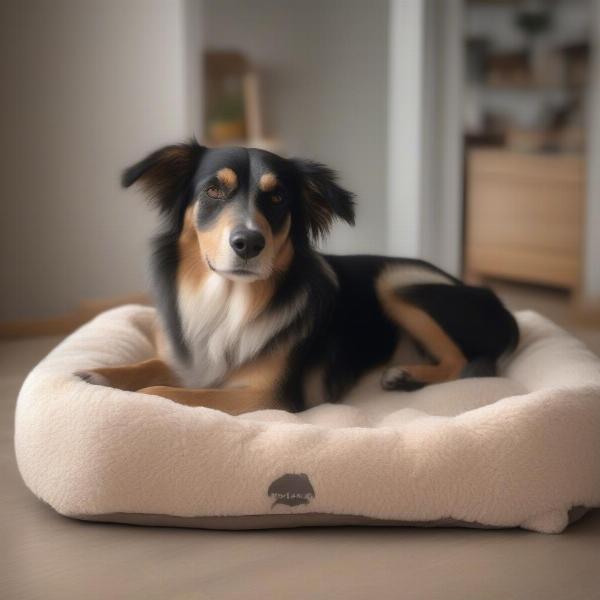A dog hurt shoulder can be a distressing experience for both the dog and its owner. Understanding the potential causes, recognizing the symptoms, and knowing how to seek appropriate treatment are crucial for a swift recovery. This guide will delve into the various aspects of shoulder injuries in dogs, providing you with the information you need to ensure your furry friend receives the best possible care.
Shoulder injuries in dogs can range from minor strains to serious dislocations or fractures. Active breeds, such as Border Collies and German Shepherds, are more prone to these injuries due to their energetic nature. However, any dog, regardless of breed or age, can experience a shoulder injury. Common causes include falls, rough play, and even repetitive strain from activities like excessive ball chasing. Recognizing the signs of a dog hurt shoulder is the first step towards effective management.
Identifying a Dog Hurt Shoulder: Symptoms and Diagnosis
A dog experiencing shoulder pain might exhibit various symptoms, some subtle and others more obvious. Limping or favoring the affected leg is a common indicator. You might also observe reduced activity levels, reluctance to jump or climb stairs, and stiffness, especially after rest. Whining or yelping when the shoulder is touched or moved is another clear sign of pain.
If you suspect your dog has a hurt shoulder, it’s essential to consult a veterinarian for a proper diagnosis. The veterinarian will conduct a thorough physical examination, assessing the range of motion and palpating the area for tenderness or swelling. X-rays or other imaging techniques might be necessary to identify the specific injury, such as a fracture, dislocation, or soft tissue damage.
Common Causes of Shoulder Injuries in Dogs
Understanding the potential causes of a dog hurt shoulder can help you take preventative measures. Trauma, such as falls or collisions, can lead to fractures or dislocations. Overexertion during strenuous activities, like running or jumping, can cause sprains or strains. sporn no pull dog harness can help reduce strain during walks and runs. Certain medical conditions, like arthritis or shoulder dysplasia, can also contribute to shoulder pain and discomfort.
Treatment Options for a Dog Hurt Shoulder
The appropriate treatment for a dog hurt shoulder depends on the specific diagnosis. Minor injuries, like strains or sprains, might require rest, pain medication, and physical therapy. More severe injuries, such as fractures or dislocations, could necessitate surgery. dog collars with choker should be used with caution, especially with shoulder injuries, as pulling could exacerbate the pain. Your veterinarian will develop a tailored treatment plan based on your dog’s individual needs.
Managing Pain and Supporting Recovery
Managing your dog’s pain and providing adequate support during recovery is critical. Follow your veterinarian’s instructions regarding pain medication and restricted activity. Providing a comfortable resting area and ensuring your dog avoids strenuous activities are essential. Physical therapy exercises, as prescribed by your veterinarian, can help improve strength and range of motion in the affected shoulder. dog tattoo ideas for guys might inspire you to show your love for your furry friend, but focus on their recovery first.
 Dog Resting, Recovering from Shoulder Injury
Dog Resting, Recovering from Shoulder Injury
Preventing Future Shoulder Injuries
While not all injuries are preventable, taking proactive measures can significantly reduce the risk of future shoulder problems. Maintaining a healthy weight, providing regular exercise appropriate for your dog’s breed and age, and avoiding excessive or repetitive strain can help protect their joints. no pull dog harnesses can also be beneficial in preventing pulling injuries. Regular veterinary check-ups can identify potential issues early on. how much does it cost for dog microchipping While this isn’t directly related to shoulder health, it’s an important aspect of responsible pet ownership.
Conclusion
A dog hurt shoulder requires prompt attention and appropriate care. By understanding the causes, symptoms, and treatment options, you can help your furry friend recover quickly and regain their mobility. Remember to consult your veterinarian for a proper diagnosis and personalized treatment plan.
FAQ
- How can I tell if my dog’s shoulder is hurt? Look for signs like limping, favoring a leg, reduced activity, stiffness, and pain when touched.
- What causes shoulder injuries in dogs? Trauma, overexertion, and underlying medical conditions can all contribute to shoulder injuries.
- What are the treatment options for a dog hurt shoulder? Treatment depends on the severity and type of injury and may include rest, medication, physical therapy, or surgery.
- How can I prevent future shoulder injuries in my dog? Maintain a healthy weight, provide appropriate exercise, and avoid excessive strain.
- When should I take my dog to the vet for a suspected shoulder injury? Consult your vet as soon as you notice any signs of discomfort or changes in your dog’s gait.
- What is the recovery time for a dog hurt shoulder? Recovery time varies depending on the injury and can range from weeks to months.
- Are there any specific breeds prone to shoulder problems? Larger, more active breeds are generally more susceptible to shoulder injuries.
ILM Dog is your trusted resource for comprehensive information on dog care and well-being. We offer expert advice on dog breeds, health, training, nutrition, grooming, and much more. Our website is dedicated to providing practical and reliable information to dog owners worldwide. Contact us for personalized advice at [email protected] or call us at +44 20-3965-8624. ILM Dog is committed to helping you provide the best possible care for your canine companion.